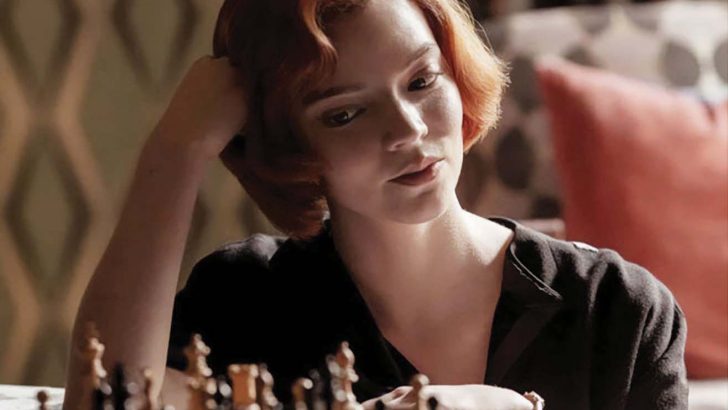Who would have thought that an absorbing drama could be made of someone playing chess!
Up to now the best chess film I’d seen was Queen of Katwe but drama series The Queen’s Gambit (Netflix) is making quite a stir and everyone I know that has seen it is impressed. Anya-Taylor Joy plays the enigmatic Beth, a chess prodigy who sweeps all opposition before her as she rises to the top of her game, literally. But is she happy? She has had a troubled past, was orphaned at a young age, was raised for a while in an orphanage that wasn’t brilliant but wasn’t as harsh as the usual clichés and was eventually adopted by a childless couple where the father is not enthusiastic and eventually drifts away. The mother is supportive but drinks a lot and finds some validation in Beth’s successes. Beth has addiction issues and seems to have difficulties with emotional connections. Chess is her obsession and others do warn her about negative aspects of her life.
Brilliantly
It is filmed and scripted brilliantly and holds the attention through all seven episodes. Like so many good dramas the secondary characters are interesting and three-dimensional and suggest their own internal dramas – the mother, the chess opponents, the amiable chess-loving twins who are her true friends. The story arc is unpredictable, and though it’s based on a novel it has the feel of a true story. We could have done without the relatively mild ‘adult content’, the intermittent crude language and one particularly offensive profanity. Otherwise it would have been a drama that parents and teens could profitably enjoy together. I found a jaundiced attitude to religion where it did feature, which wasn’t very much.
Lies
A few weeks ago I reviewed the first episode of drama series Sacred Lies (Facebook Watch). Over the remaining episodes I found the story still engaging, but though it was exploring the world of a cult, the idea of religion in general didn’t fare very well. There were too many insulting swipes at God and religion without any apparent understanding of it, or any awareness of the love that’s preached and practised by so many. Religious characters were portrayed as naïve, gullible or superstitious. One cynical character in prison, a young woman with same-sex attraction, who seemed to be clued in to reality at a certain level posited the lazy notion that science and religion conflict with instead of complement each other. She quoted the ‘Big Bang Theory’, unaware – I presume – that this was developed by a Jesuit priest-scientist. Asked by the young girl, Minnow, who’s an ex-cult victim, what was there before the Big Bang she said we don’t know…yet. Minnow is confused but knows she’s had a strange experience that can’t so easily be explained away. As well as dismissing the idea of God, the cynical young woman was also, significantly, dismissive of the idea of love, and was both blasphemous and violent. The hard shell seemed indicative of inner trauma – both characters are in a reform institution for young offenders. One episode explored the age-old question about why bad things happen to good people. An FBI psychologist said this question was one of the reasons why people turn to God. Despite Minnow’s awful experiences at the hands of the cult, he said that “not all things done in the name of God are bad”, that faith can inspire charity, loyalty and compassion and that religion can give people a sense of meaning. Minnow, thoroughly disillusioned with her cult’s version of religion, explored the approaches to faith of the Christian, Jewish and Muslim girls in the juvenile detention centre. In response to her atheist cellmate she said that “science is great but it doesn’t have all the answers I’m looking for”. When she heard a Bible quote urging us to beware false prophets it really resonated with her. In the final episode she concluded “no matter what you believe it’s no excuse for hurting someone”.
Crude
Last Thursday night saw the last episode, thankfully, of Fantasy Island (RTÉ 2) – a crude cartoon series featuring a repulsive priest, Fr Murphy, described in the show as a “dog-collared deviant”. The whole thing is crude, pointless, humourless and offensive, as if foul language is inherently edgy and creative.
It’s strange how even the tiniest of perceived offences to some groups cause outrage, but others can be thrashed with impunity.
PICK OF THE WEEK
A Very Country Christmas
BBC One Sunday December 6, 10.30pm
To mark Advent 2020, Ellie Harrison and Angellica Bell will celebrate three very different country Christmasses by joining in the making, shaping, gathering and worshipping of three regions in Britain as they prepare for Christmas.
Mass
RTÉ One Sunday December, 11am
Celebrating the work of the Society of St Vincent de Paul in meeting the needs, and sustaining the dignity, of the marginalised in our society.
Gerard Manley Hopkins, priest-poet
EWTN Tuesday December 8, 9am and Wednesday December, 5pm
An examination of the life of Gerard Manley Hopkins, an English poet and Jesuit priest who spent time in Dublin.


 Brendan O’Regan
Brendan O’Regan Anya Taylor-Joy in The Queen’s Gambit
Anya Taylor-Joy in The Queen’s Gambit 